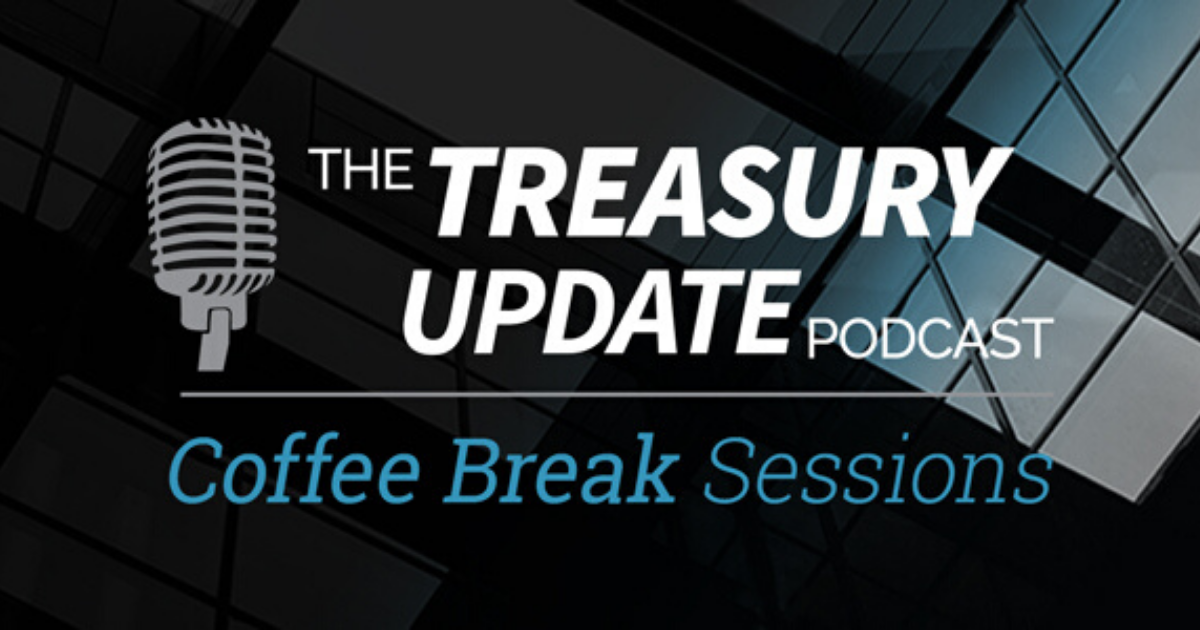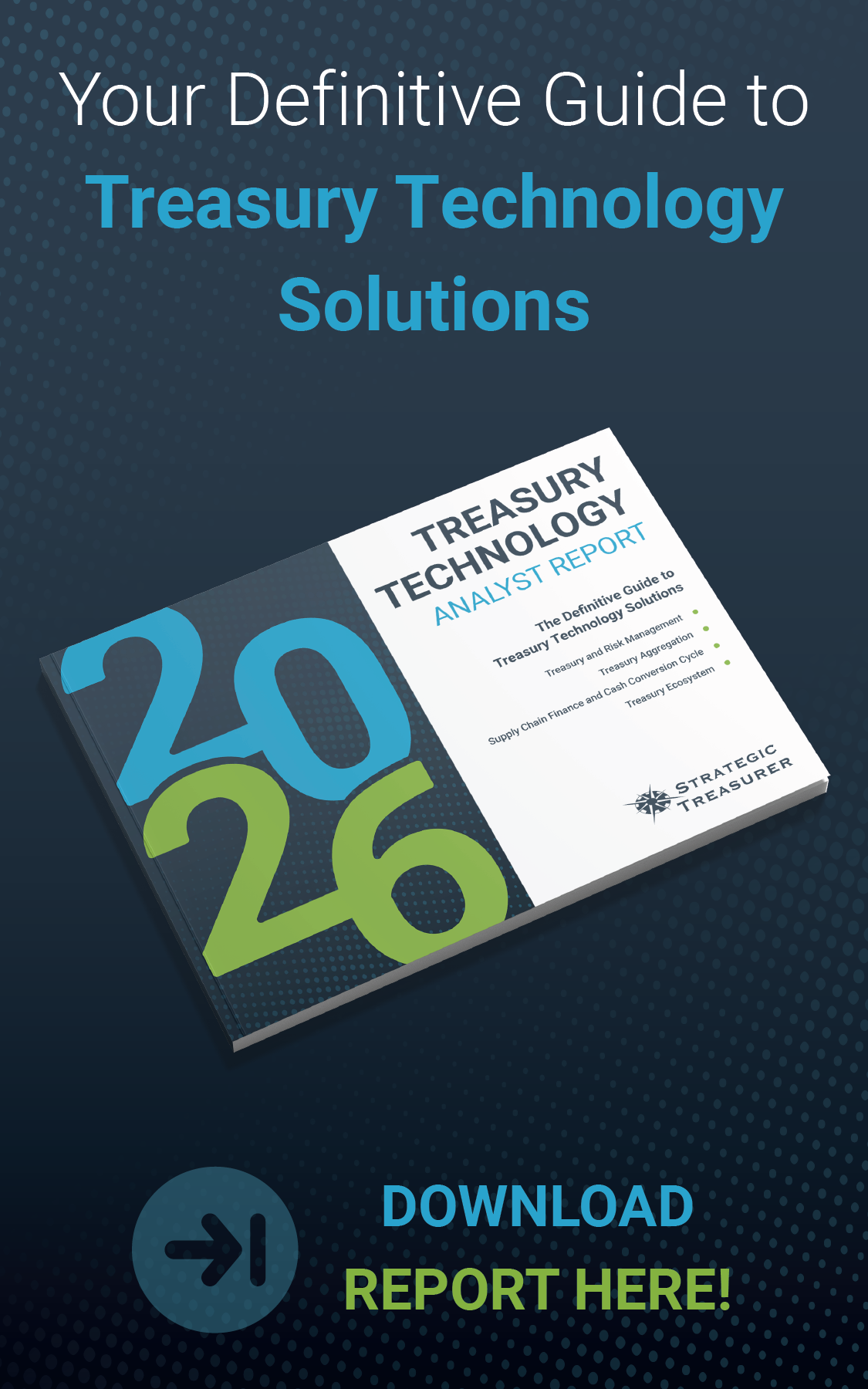
Session 22
Coffee Break Session:
What Is Mobile Device Management?
What is mobile device management? Coffee Break Session Host Alexa Cook catches up with Strategic Treasurer’s Managing Partner Craig Jeffery to discuss the foundational elements of mobile device management. They share insights on how it can be positively leveraged and why it’s important to treasury. Listen in to this bite-size conversation to learn more.
Host:
Alexa Cook, Strategic Treasurer


Speaker:
Craig Jeffery, Strategic Treasurer


Episode Transcription - CBS Episode 22: What is Mobile Device Management?
Alexa:
Hi, everyone. Welcome back to the Treasury Update Podcast Coffee Break Sessions. This is your host Alexa and today I am joined with Craig Jeffery managing partner of Strategic Treasure. Welcome back, Craig.
Craig Jeffery:
It’s good to talk with you again Alexa.
Alexa:
Thanks. So today we’re going to be talking about Mobile Device Management. So Craig, do you want to start us off with what is Mobile Device Management?
Craig Jeffery:
You told me I had to be brief, so it’s a method of protecting corporate data on mobile devices like your phone or a tablet.
Alexa:
Okay. How does it work?
Craig Jeffery:
Mobile Device Management, or MDM, protects data on mobile devices and on whether they’re company owned or it’s a, ‘bring your own device’ through some containers and rules that isolate and encrypt the data. It also has permissions that allow a stolen device or a lost device to be wiped remotely so you can remove all corporate data. So it’s a way of protecting corporate data. You don’t have to put your personal data, your personal pictures, et cetera, within those containers within that process, but it also, it makes it so the user let’s say using a personal phone, you can’t delete MDM on your own. It requires the administrator to release the security measures and then therefore won’t pass corporate data to the phone. So it has to be cleaned off before you can gain 100% control of every area of your mobile device.
Alexa:
Okay. I was going to ask a follow-up question on that whether or not it would wipe the whole phone or just different sections of it, but I feel like you answered that by saying it could wipe certain containers.
Craig Jeffery:
Yeah. It’s two environments. That is one of the fears. It’s like, “Hey, it’s my phone. I don’t want to carry two phones for work,” but it allows work to delete the containers, that old work information.
Alexa:
Gotcha. But then I guess, what is the MDM used for and why is it important? I feel like we’ve already touched on it, but if you wanted to maybe elaborate a little bit more on why it’s important and what it’s used for?
Craig Jeffery:
Well, the importance is really tied up in allowing us to be mobile so we can get work done easily and efficiently in a secure environment when we’re on the move, whether we’re in a meeting, and we’re checking something, or we’re passing information, you want to be able to respond while we’re not sitting at our desktops or on our most stationary objects. So it allows us some of that freedom.
Alexa:
Okay. And what are some of the advantages of using these MDM solutions?
Craig Jeffery:
Well, I can be mobile. I can carry my personal phone as opposed to a personal phone and a work phone. And if you just use a work phone, obviously they’re going to install MDM on it for security. I think that’s the key element why there’s an advantage to it. It allows me to be more effective on the run, on the move.
Alexa:
Okay. Are there any challenges with, I guess, having MDM or maybe managing it?
Craig Jeffery:
There’s a little bit is because you don’t control your whole phone. So if it’s your phone you’re not controlling every aspect of it. Once you say, I want to get my emails onto my phone, well, you often saw MDM so that work emails where content stays within those protected containers. You may not like that because you can’t say, “Ah, I’m done. I can uninstall it tomorrow or today. I have to go and tell work.” It’s like, “I don’t want to get my emails on my phone. Please remove MDM.” Then they set it up through the MDM solution, then it propagates to your phone and deletes the work information and removes that security feature. So, some people don’t like that, especially if you think, can work see all my other stuff? Will it delete? Can they wipe all my favorite pictures, my notes, and settings from Instagram or whatever program I’m using? So there’s obviously some concerns about that aspect.
Alexa:
Okay. So why should Treasury care about MDM or Mobile Device Management?
Craig Jeffery:
Yeah. Treasury doesn’t need to know too much about it other than security matters to everyone in the company. This matters to Treasury and payment security in particular matters to Treasury, and because criminals want to exploit any access point, mobile devices have long been a particular weak point. And so, every data and access point needs to be well controlled as one of your layers of security and MDM is an important layer of security. It’s an important layer of security for people that are mobile and at other locations.
Alexa:
So, I’m going to go ahead and do a quick recap of everything we’ve covered. So, starting with what is Mobile Device Management? It’s really just a method to protect corporate data on your phone. And it really works by, I guess, isolating or encrypting data that’s work or corporate related into different containers. And that would give, I guess, your office permissions to wipe this data remotely and it’s important or gives the advantage of allowing employees to work from remote locations or giving them the ability to have only one phone instead of two.
Alexa:
Some of the challenges that might come up from that is that if you want to delete it, you have to go back through then the MDM and go step through those steps that you outlined. I think you have to delete the emails first and then back through the MDM. And then, Treasury should care about this specifically because security is important and in particular, payment security is important, and mobile devices have always been a weak point like you’d said. So this is just an extra layer of security that Treasury should maybe start to consider if they haven’t already. Was there anything else I missed or anything you wanted to add there?
Craig Jeffery:
No, that’s a really good lay-person definition of what MDM is.
Alexa:
All right. Well, thank you for joining me today, Craig, and to all of our listeners, make sure you tune in every first and third, Thursday of the month for a new episode. And as always, we look forward to hearing your feedback or if you want to connect, you can send us an email at podcast@strategictreasurer.com. Thanks again, Craig.
Global Recovery Monitor
Join us in our ongoing market research throughout the coronavirus crisis. Take this 5-minute survey and receive early access to the results report.
Coffee Break Sessions – A Treasury Update Podcast Series
A part of the Treasury Update Podcast, Coffee Break Sessions are 6-12 minute bite-size episodes covering foundational topics and core treasury issues in about the same amount of time it takes you to drink your coffee. The show episodes are released every first and third Thursday of the month with Special Host and Treasury Consultant Alexa Cook of Strategic Treasurer.




